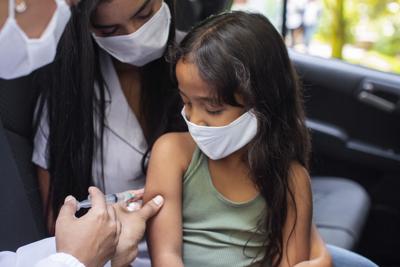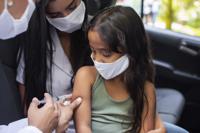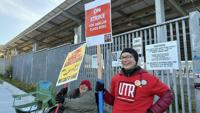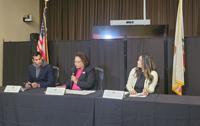
Close-up of a small girl wearing face mask receiving vaccination with mother in car. Family getting covid-19 vaccine at drive thru vaccination center in the city during pandemic. Photo by Getty Images
As a measles outbreak unexpectedly spreads along the United States and the East Coast, concerns are raised throughout the nation.
A recent CBS News investigation revealed that at least 8,500 American schools are at risk of similar outbreaks as vaccination rates drop. In the Golden State, schools are required to keep track of students' immunization records, even though parents must immunize their children based on medical advice.
According to the investigation, 350 Southern California schools fail to meet the recommended threshold for preventing measles outbreaks. These troubling numbers are at the forefront of many local medical professionals' minds.
CALÓ News Spoke with Dr. Sherrill Brown, medical director for infection prevention at AltaMed Health Services about what is the contagious measles virus.
“Measles is a viral infection and it usually causes upper respiratory symptoms like cough, runny nose, sore throat, red eyes, high fever and rashes,” she said. “It also spreads through the air as if it's an airborne illness.”
According to Dr. Brown, people with no immunity to the virus are more susceptible to it because they have never been infected or vaccinated against it. If an individual thinks they have been infected with the contagious virus, she explained what they should do.
“They should isolate themselves from other people and wear a mask. They should also reach out to their doctor to let them know that they think they might have measles and explain to them what their symptoms are. The doctor should also reach out to them so they can come to the clinic and get tested,” she said. She also emphasized how important it is to reach out to a provider ahead of time so that they can follow safety protocols and isolate other patients and keep others from being infected or spreading the virus.
Dr. Brown also serves as a vaccine educator at AltaMed and is closely involved in the rollout of new vaccines and improving vaccine uptake among patients. “The reason why we give people vaccinations and kids vaccinations is to try to prevent the illness that the vaccine is for,” she said.
She also said that the illnesses that they try to prevent are very serious illnesses and can cause kids to get really sick, get hospitalized and sometimes even die. That’s why it is very important for her that children get vaccinated so that they can prevent certain situations from escalating to that extreme.
Dr. Brown said that the measles vaccinations work well at preventing infection. “Since we’ve been vaccinating people, we hardly ever see measles anymore. Most providers and clinical people have never really seen a live case of measles. Most of us just read about it in the textbooks because the vaccines work so well. But a long time ago, when people weren’t vaccinated ,you would see a lot of kids hospitalized with pneumonia, ear infections and sometimes they would lose their hearing and get really sick. That’s why it is important that children get vaccinated to prevent all these severe illnesses,” she said.
According to a data analysis from the CDC, the rate of children vaccinations has been dropping. A recommendation from the CDC is to vaccinate children ahead of school entry or during provisional enrollment periods, so the exemptions associated with barriers to vaccination could be reduced.
Dr. Brown believes that the reason for the drop in vaccination rates is because parents are choosing not to vaccinate their children. “I think that has to do with parents hearing scary information from other people who are not highly educated on what they are talking about. So, they are scaring them into not wanting to get their kids vaccinated,” She said.
She also spoke about what happens once you get a proportion of the population that’s not vaccinated. “That’s when you start to see outbreaks,” Dr. Brown said.
On February 1st, the L.A. County Department of Public Health (PH) confirmed one case of measles in a resident who traveled through Los Angeles International (LAX) airport while infectious on January 25.
According to the news release by PH, the person arrived on Turkish Airlines 009 flight at the Tom Bradley International Terminal B, Gate 157 on January 25, at 5 p.m. Individuals who were at Terminal B from 5 p.m. to 9 p.m. may have been at risk of developing measles due to exposure to this traveler. For more information on this case, click here.











(0) comments
Welcome to the discussion.
Log In
Keep it Clean. Please avoid obscene, vulgar, lewd, racist or sexually-oriented language.
PLEASE TURN OFF YOUR CAPS LOCK.
Don't Threaten. Threats of harming another person will not be tolerated.
Be Truthful. Don't knowingly lie about anyone or anything.
Be Nice. No racism, sexism or any sort of -ism that is degrading to another person.
Be Proactive. Use the 'Report' link on each comment to let us know of abusive posts.
Share with Us. We'd love to hear eyewitness accounts, the history behind an article.